C++20: An Infinite Data Stream with Coroutines
My story to coroutines in C++20 goes on. Today I dive deep into the coroutines framework to create an infinite data stream. You have to read the two previous posts, “C++20: Coroutines – A First Overview“, and “C++20: More Details to Coroutines” to be prepared.
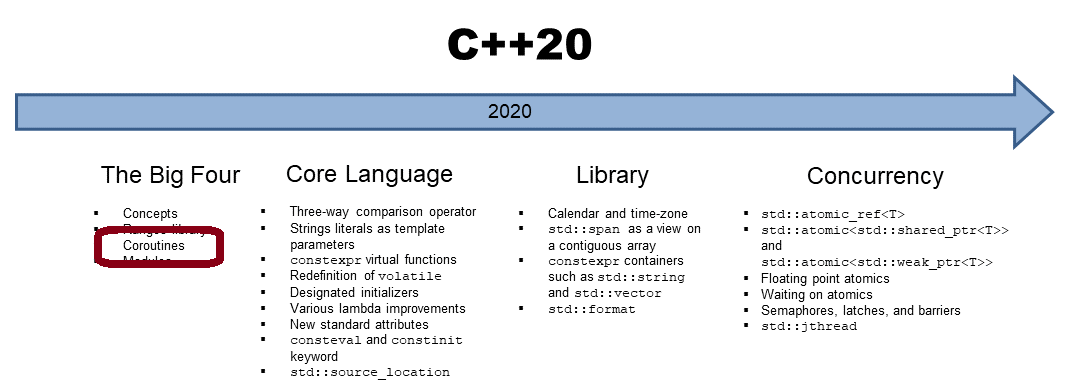
The framework for writing coroutines consists of more than 20 functions that you partially have to implement and partially could overwrite. Therefore, you can tailor the coroutine to your needs. In the end, you can, for example, create a generator Generator<int> for an infinite data stream such as the following one:
Generator<int> getNext(int start = 0, int step = 1) { auto value = start; for (int i = 0;; ++i) { co_yield value; value += step; } }
Now, we know the destiny of our job. Let’s start.
The Framework
A coroutine comprises three parts: the promise object, the coroutine handle, and the frame.
- Promise object: The promise object is manipulated from inside the coroutine and delivers its result via the promise object.
- Coroutine handle: The coroutine handle is a non-owning handle to resume or destroy the coroutine frame from the outside.
- Coroutine frame: The coroutine frame is an internal, typically heap-allocated state. It consists of the already mentioned promise object, the copied parameters of the coroutine, the representation of the suspension points, local variables whose lifetime ends before the current suspension point, and local variables whose lifetime exceeds the current suspension point.
The Simplified Workflow
When you use co_yield, co_await, or co_return in a function, the function becomes a coroutine, and the compiler transforms its body to something equivalent to the following lines.
{
Promise promise;
co_await promise.initial_suspend();
try
{
<function body>
}
catch (...)
{
promise.unhandled_exception();
}
FinalSuspend:
co_await promise.final_suspend();
}
<function body> stands for the original function body. The simplified workflow of the coroutine consists of the following phases.
 Modernes C++ Mentoring
Modernes C++ Mentoring
Do you want to stay informed: Subscribe.
The coroutine begins the execution
- Allocates the coroutine frame
- Copies all function parameters to the coroutine frame
- Creates the promise object promise
- Calls promise.get_return_object() to create the coroutine handle and keep it in a local variable. The result of the call will be returned to the caller when the coroutine first suspends.
- Calls promise.initial_suspend(), and co_await‘s its result. The promise type typically returns std::suspend_never for eagerly-started coroutines or std::suspend_always for lazily-started coroutines.
- The body of the coroutine is executed when co_await promise.initial_suspend() resumes
The coroutine reaches a suspension point
- The coroutine handle (promise.get_return_object()) is returned to the caller, which resumes the coroutine
The coroutine reaches co_return
- Calls promise.return_void() for co_return or co_return expression, where expression has type void
- Calls promise.return_value(expression) for co_return expression, where expression has non-type void
- Destroys all stack-created variables
- Calls promise.final_suspend() and co_await‘s its result
The coroutine is destroyed (by terminating via co_return, an uncaught exception, or the coroutine handle)
- Calls the destruction of the promise object
- Calls the destructor of the function parameters
- Frees the memory used by the coroutine frame
- Transfers control back to the caller
Let’s put the theory into praxis.
An Infinite Data Stream with co_yield
The following program produces an infinite data stream. The coroutine getNext uses co_yield to create a data stream that starts at start and gives on request the next value, incremented by step.
// infiniteDataStream.cpp #include <coroutine> #include <memory> #include <iostream> template<typename T> struct Generator { struct promise_type; using handle_type = std::coroutine_handle<promise_type>; Generator(handle_type h): coro(h) {} // (3) handle_type coro; ~Generator() { if ( coro ) coro.destroy(); } Generator(const Generator&) = delete; Generator& operator = (const Generator&) = delete; Generator(Generator&& oth) noexcept : coro(oth.coro) { oth.coro = nullptr; } Generator& operator = (Generator&& oth) noexcept { coro = oth.coro; oth.coro = nullptr; return *this; } T getValue() { return coro.promise().current_value; } bool next() { // (5) coro.resume(); return not coro.done(); } struct promise_type { promise_type() = default; // (1) ~promise_type() = default; auto initial_suspend() { // (4) return std::suspend_always{}; } auto final_suspend() { return std::suspend_always{}; } auto get_return_object() { // (2) return Generator{handle_type::from_promise(*this)}; } auto return_void() { return std::suspend_never{}; } auto yield_value(const T value) { // (6) current_value = value; return std::suspend_always{}; } void unhandled_exception() { std::exit(1); } T current_value; }; }; Generator<int> getNext(int start = 0, int step = 1) noexcept { auto value = start; for (int i = 0;; ++i){ co_yield value; value += step; } } int main() { std::cout << std::endl; std::cout << "getNext():"; auto gen = getNext(); for (int i = 0; i <= 10; ++i) { gen.next(); std::cout << " " << gen.getValue(); // (7) } std::cout << "\n\n"; std::cout << "getNext(100, -10):"; auto gen2 = getNext(100, -10); for (int i = 0; i <= 20; ++i) { gen2.next(); std::cout << " " << gen2.getValue(); } std::cout << std::endl; }
The main function creates two coroutines. The first gen returns the values from 0 to 10, and the second gen2 from 100 to -100. Before I dive into the workflow, thanks to Compiler Explorer and GCC 10, here is the program’s output.

The numbers in the program infiniteDataStream.cpp stand for the steps in the first iteration of the workflow.
- Creates the promise
- Calls promise.get_return_object() and keep the result in a local variable
- Creates the generator
- Calls promise.initial_suspend(). The generator is lazy and, therefore, suspends always.
- Asks for the next value and returns if the generator is consumed
- Triggered by the co_yield call. The next value is afterward available.
- Gets the next value
In additional iterations, only steps 5 to 7 are performed.
It is pretty challenging to understand the underlying framework of coroutines. Playing with existing coroutines and observing the changed behavior may be the easiest way to grasp them. The presented coroutine that creates an infinite data stream is a good starting point for your first experiments: use the link to the executable program on Compiler Explorer.
What’s next?
I used co_yield to create an infinite data stream in today’s post. My next post is about thread synchronization with co_await.
Thanks a lot to my Patreon Supporters: Matt Braun, Roman Postanciuc, Tobias Zindl, G Prvulovic, Reinhold Dröge, Abernitzke, Frank Grimm, Sakib, Broeserl, António Pina, Sergey Agafyin, Андрей Бурмистров, Jake, GS, Lawton Shoemake, Jozo Leko, John Breland, Venkat Nandam, Jose Francisco, Douglas Tinkham, Kuchlong Kuchlong, Robert Blanch, Truels Wissneth, Mario Luoni, Friedrich Huber, lennonli, Pramod Tikare Muralidhara, Peter Ware, Daniel Hufschläger, Alessandro Pezzato, Bob Perry, Satish Vangipuram, Andi Ireland, Richard Ohnemus, Michael Dunsky, Leo Goodstadt, John Wiederhirn, Yacob Cohen-Arazi, Florian Tischler, Robin Furness, Michael Young, Holger Detering, Bernd Mühlhaus, Stephen Kelley, Kyle Dean, Tusar Palauri, Juan Dent, George Liao, Daniel Ceperley, Jon T Hess, Stephen Totten, Wolfgang Fütterer, Matthias Grün, Phillip Diekmann, Ben Atakora, Ann Shatoff, Rob North, Bhavith C Achar, Marco Parri Empoli, Philipp Lenk, Charles-Jianye Chen, Keith Jeffery, Matt Godbolt, Honey Sukesan, bruce_lee_wayne, Silviu Ardelean, and Seeker.
Thanks, in particular, to Jon Hess, Lakshman, Christian Wittenhorst, Sherhy Pyton, Dendi Suhubdy, Sudhakar Belagurusamy, Richard Sargeant, Rusty Fleming, John Nebel, Mipko, Alicja Kaminska, Slavko Radman, and David Poole.
| My special thanks to Embarcadero |  |
| My special thanks to PVS-Studio |  |
| My special thanks to Tipi.build |  |
| My special thanks to Take Up Code |  |
| My special thanks to SHAVEDYAKS |  |
Modernes C++ GmbH
Modernes C++ Mentoring (English)
Rainer Grimm
Yalovastraße 20
72108 Rottenburg
Mail: schulung@ModernesCpp.de
Mentoring: www.ModernesCpp.org


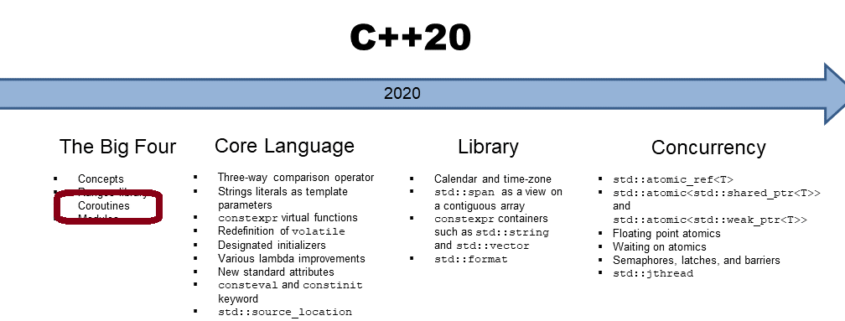
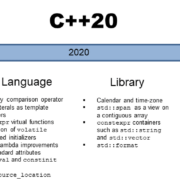
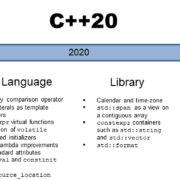
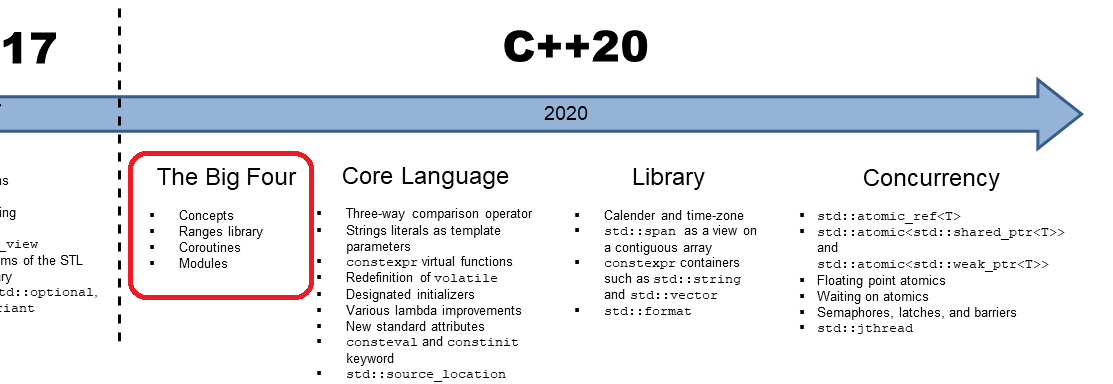

Leave a Reply
Want to join the discussion?Feel free to contribute!